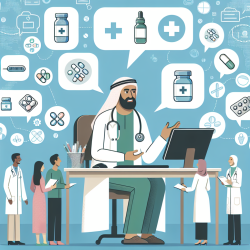Understanding the Barriers to Medicine Access for Syrian Refugees
In a recent study published in the International Journal of Environmental Research and Public Health, researchers explored the barriers Syrian asylum seekers and refugees (AS&Rs) face in accessing medicines in Germany. The study highlighted language barriers as a significant obstacle, particularly affecting female refugees, older individuals, and those with chronic diseases.
Key Findings and Implications for Practitioners
The study utilized a cross-sectional survey to gather data from 1,641 respondents, using both quantitative and qualitative methods. The findings revealed that language barriers had a more pronounced effect on medicine access than other factors, such as financial barriers or the availability of specific medicines. The impact was notably stronger among female participants, older individuals, and those with chronic illnesses.
Practitioners can enhance their services by focusing on the following strategies:
- Language Support: Implement language learning programs tailored for refugees, with a focus on medical terminology. This is particularly crucial for female and older refugees, as well as those with chronic conditions.
- Translated Materials: Provide translated medical leaflets and instructions to help overcome language barriers. This can significantly improve understanding and adherence to medication regimens.
- Cultural Sensitivity: Recognize and respect cultural beliefs regarding medicines, such as those containing alcohol or pork products. Offer alternatives when available, and engage in open discussions to address concerns.
Encouraging Further Research
The study opens avenues for further research into the specific needs of refugee populations in healthcare settings. Future studies could explore the effectiveness of language programs and the role of cultural beliefs in healthcare access. Additionally, research into the development of culturally sensitive healthcare policies could provide valuable insights for practitioners and policymakers.
Conclusion
By addressing language barriers and cultural sensitivities, healthcare practitioners can significantly improve access to medicines for Syrian refugees. These efforts not only enhance the quality of care but also contribute to better health outcomes for vulnerable populations.
To read the original research paper, please follow this link: Barriers to Accessing Medicines among Syrian Asylum Seekers and Refugees in a German Federal State.










